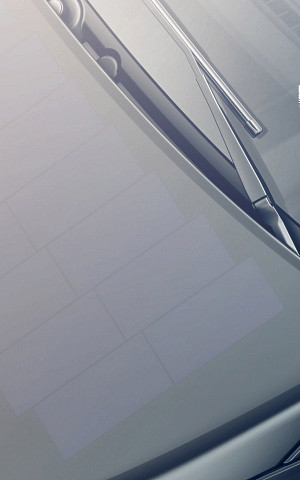Sono Motors Signs Purchase Order With a Second Automotive Passenger Car Manufacturer
Solar Technology Allows Convenience for Car Owners, Grid-Independent Charging, and a Reduction of Running Costs
Sono Motors Focuses on Retrofitting and Integrating Its Solar Technology Onto Third Party Vehicles in Four Core Industries: Passenger Vehicles, Buses, Refrigerated Vehicles, and Recreational Vehicles
Company Now Has Total of 25 Non-binding Letters of Intent, Purchase Orders or Customer Contracts
MUNICH, Germany, 8 March 2023 – The solar tech company Sono Group N.V. (NASDAQ: SEV) (“Sono Motors” or the “Company”) today announced it has signed a purchase order with a second passenger car manufacturer, one of the 10 largest in the world. The scope of the order is delivery of solar body panels for one vehicle, so that, together with Sono Motors, the OEM is able to explore solar integration into their cars. The Company announced the first order from a passenger car manufacturer in December last year. This brings the Company’s total number of customers and partners for its solar technology to 25, a significant increase from 10 partners at the time of the Company’s IPO 15 months ago.
The Company has developed solar power electronics for high-voltage automotive use cases, such as passenger cars. Sono Motors has specialized in a unique manufacturing method to seamlessly integrate solar cells into polymer to be used for the exterior of a passenger vehicle. Solar charging allows more convenience for the vehicle owner, less dependency on battery charging infrastructures and a reduction in running costs compared to ordinary BEVs. Car manufacturers and fleet operators may use the Company’s proprietary technology in their own products to retrofit existing vehicles, or for new production vehicles, to extend the range of BEVs or to comply with emission regulations.
“We see a whole industry moving towards solar integration into vehicles. We believe we are at the forefront with our proprietary polymer-based solar technology for passenger vehicles” states Laurin Hahn, co-founder and CEO of Sono Motors. “Additionally, we believe that the steep increase in electric vehicle sales and the relatively slower increase in charging stations will create a bottleneck for the adoption of electric vehicles on a larger scale. We believe that even within the next few years, many people living in apartments without private access to charging stations will be reluctant to buy electric vehicles due to uncertainty whether they will be able to find relevant charging options. This will put even more focus on electric vehicles with solar integration.”
Sono Motors is currently working as a development partner or supplier with customers in Europe and the United States. Customers include CHEREAU, Kögel, and Volkswagen subsidiary Scania. Going forward, Sono Motors intends to focus specifically on retrofitting and integrating its solar technology onto third party vehicles in four core industries – passenger vehicles, buses, refrigerated vehicles, and recreational vehicles. The Company is currently scaling up its technology, starting with the introduction of the next generation of its retrofit solution for cleaner public transportation — the ‘Solar Bus Kit’.
FORWARD LOOKING STATEMENT
This press release includes forward-looking statements. The words "expect", "anticipate", "intend", "plan", "estimate", "aim", "forecast", "project", "target", “will” and similar expressions (or their negative) identify certain of these forward-looking statements. These forward-looking statements are statements regarding the Company's intentions, beliefs, or current expectations. Forward-looking statements involve inherent known and unknown risks, uncertainties, and contingencies because they relate to events and depend on circumstances that may or may not occur in the future and may cause the actual results, performance, or achievements of the Company to be materially different from those expressed or implied by such forward looking statements. These risks, uncertainties and assumptions include, but are not limited to (i) the impact of the global COVID-19 pandemic on the global economy, our industry and markets as well as our business, (ii) risks related to our limited operating history, the rollout of our business and the timing of expected business milestones and risks related to future results of operation, (iii) risks related to required funding and our ability to continue as a going concern, (iv) risks related to our ability to monetize our solar technology, (v) risks related to the uncertainty of the projected financial information with respect to our business, (vi) potential cancellations of reservations, leading to significant cash-outflows, which may exceed our available liquid means and could require us to file for insolvency, (vii) the impact of the change in our strategy to focus on our solar business on our reputation, (viii) effects of competition on our future business and (ix) changes in regulatory requirements, governmental incentives and fuel and energy prices. For additional information concerning some of the risks, uncertainties and assumptions that could affect our forward-looking statements, please refer to the Company’s filings with the U.S. Securities and Exchange Commission (“SEC”), which are accessible on the SEC’s website at www.sec.gov and on our website at ir.sonomotors.com. Many of these risks and uncertainties relate to factors that are beyond the Company's ability to control or estimate precisely, such as the actions of regulators and other factors. Readers should therefore not place undue reliance on these statements, particularly not in connection with any contract or investment decision. Except as required by law, the company assumes no obligation to update any such forward-looking statements.
Sono Group N.V. (NASDAQ: SEV) is on a pioneering mission to accelerate the revolution of mobility by making every vehicle solar. Sono Motors’ disruptive solar technology has been engineered to be seamlessly integrated into a variety of vehicle architectures — including third-party OEM cars, buses, refrigerated vehicles, and recreational vehicles — to extend range and reduce fuel costs as well as the impact of CO2 emissions, paving the way for climate-friendly mobility.



